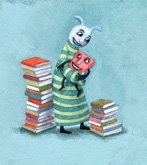 Asne Seierstad, a Norwegian journalist/war correspondent, describes the life of a middle class family she lived with in Afghanistan after the fall of the Taliban. She follows the family of 'Sultan Khan' in their daily lives and what we see is often unsettling. She describes the tension when Khan takes a second wife shortly after Sharifa, his first wife, turns 50. The view we have of the women in this home is unfathomable. The head of this family likes the idea of equal rights for women, and would like to see women in positions of power in his government, but obviously not in his home.
Asne Seierstad, a Norwegian journalist/war correspondent, describes the life of a middle class family she lived with in Afghanistan after the fall of the Taliban. She follows the family of 'Sultan Khan' in their daily lives and what we see is often unsettling. She describes the tension when Khan takes a second wife shortly after Sharifa, his first wife, turns 50. The view we have of the women in this home is unfathomable. The head of this family likes the idea of equal rights for women, and would like to see women in positions of power in his government, but obviously not in his home.The cultural difference that we read about are often distressing. This is a middle class, literate family yet their home is bullet ridden and they have no furniture except for Khan's locked bookcase, no electricity, and very rarely running water. Marriages are arranged, women are slaves, first in their own families and then in their marriages. Women can only go out with a male escort and a son's education is often paid for by the arranged marriage of a daughter. I would have thought that education would be a priority in this literate household, but even Khan's sons are removed from school to work long hours in his shops. We follow Masur's (Sultan's oldest teenage son) on pilgimage to a holy shrine and are left wondering what it really meant to him.
Shah Mohammed Rais, the real Kabul book seller that Seierstad depicted in her book eventually filed lawsuit to block its publication, believing that the book libeled him.
While this book was very interesting, it lacked power. I found it unstructured and plotless. The last chapters felt like an afterthought, not really a gathering together of her points nor a summation of their lives, I was disappointed. Actually it read like a news article which is not suprising given Asne Seierstad's history. I recommend reading it but don't expect to be wowed.
Mary
My bio


1 comment:
I thought the book was excellent. Obviously written by a journalist; she got into the story with necessary details and nothing flowery. The book is thought provoking and an insight into a lifestyle and culture that adheres to old-fashioned traditions, which I believe is painfully unfair for the women who live there. I’m looking forward to her other book, A Hundred and One Days: A Baghdad Journal.
Post a Comment